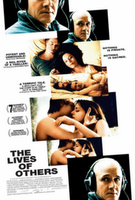 In his acceptance speech, Toyland director Jochen Alexander Freydank spoke of spending four years of his life on a fourteen minute film. As winner of the Academy Award for best live action short film, those efforts seem to have paid off. Though seen by relatively few, it is arguably the worthiest winner of the night, saying much in those fourteen minutes.
In his acceptance speech, Toyland director Jochen Alexander Freydank spoke of spending four years of his life on a fourteen minute film. As winner of the Academy Award for best live action short film, those efforts seem to have paid off. Though seen by relatively few, it is arguably the worthiest winner of the night, saying much in those fourteen minutes.In Toyland (Spielzeugland), terms like Aryan and Jew mean little to two little boys, but have tragic wider implications in 1942 Germany. For a single Aryan mother, it is too difficult to explain to her son that his best friend will soon be transported with his family to a concentration camp, so she tells him they are leaving for Toyland. Naturally, her son wants to go to a place like Toyland too, as the mother’s white lie leads to complications she had not foreseen. It is difficult to write at length about Toyland without revealing too much of the story, given its brevity. However, it well earns the emotional payoff of its elegant conclusion that implies a lifetime of memories through its poetic closing image.
Toyland vividly captures a mother’s panic for a lost child, but also shows a moment of dramatic heroism. Months after screening the film, I still ponder the mother’s original intentions in that pivotal scene, but always come to the conclusion that it does not matter. It is truly a film with staying power.
To its credit, the Brooklyn International Film Festival programmed Toyland last summer. New Yorkers have also had an opportunity to see it as part of Academy screenings of this year’s nominated shorts. It was one of last year’s best films, of any length, and the best recipient of Oscar gold this year.


